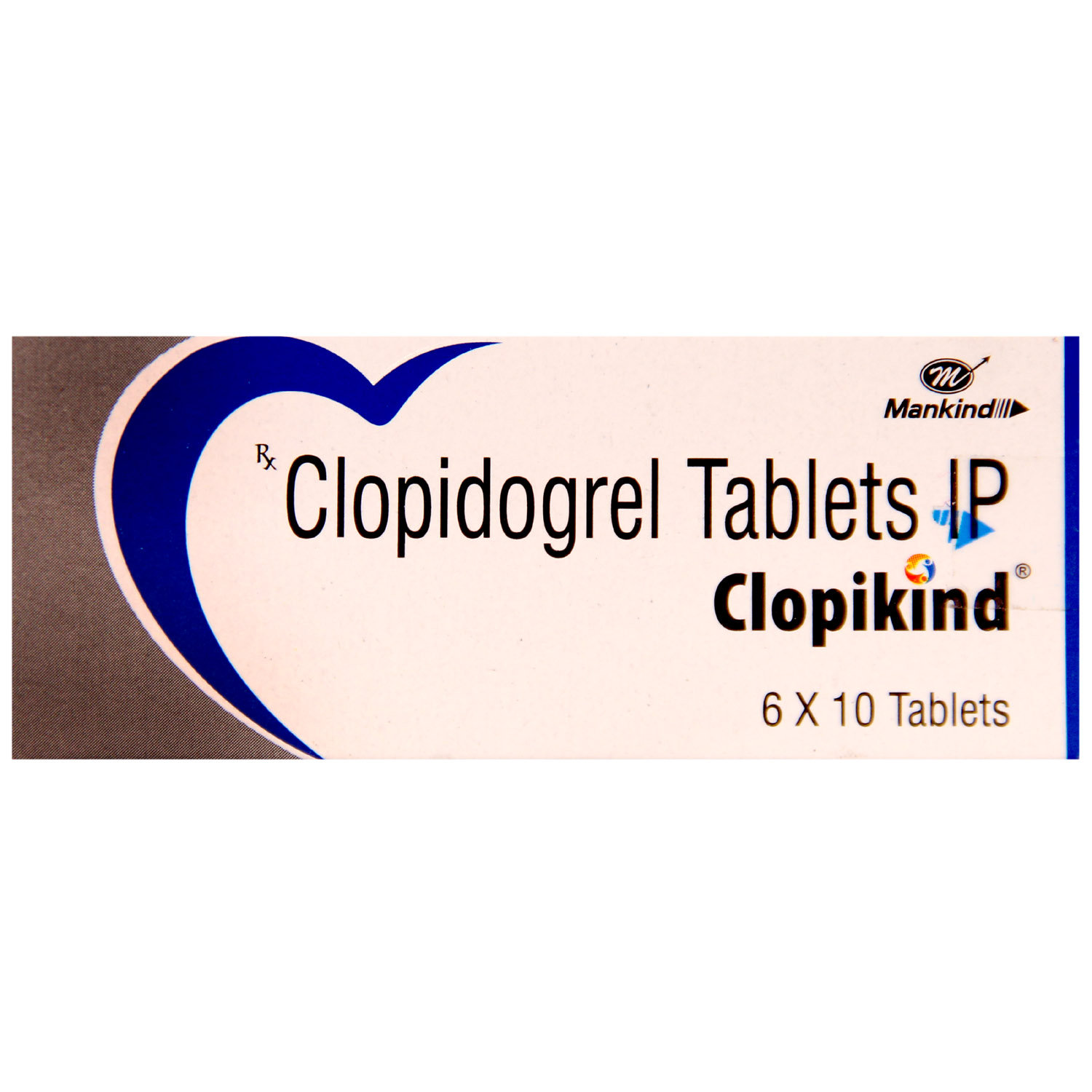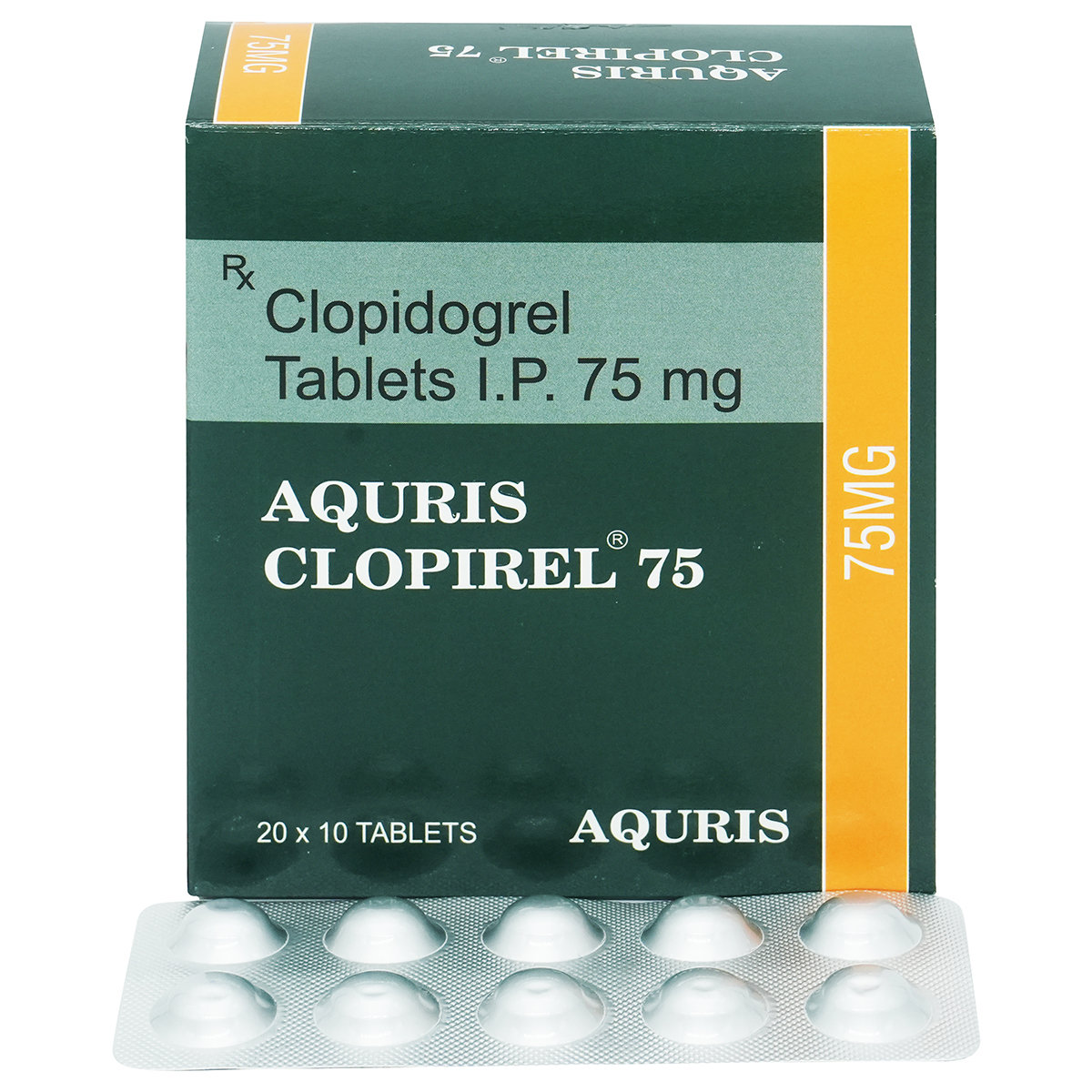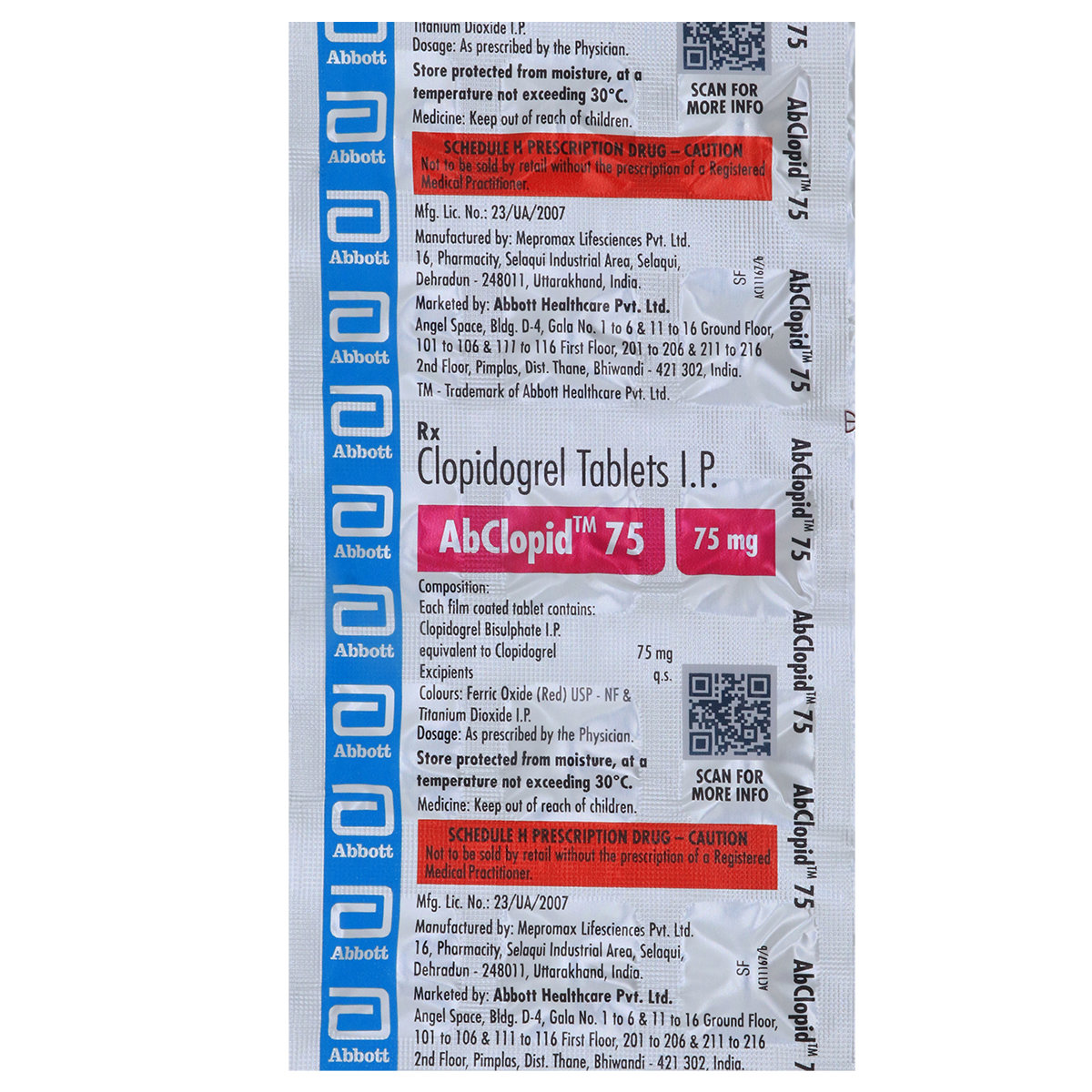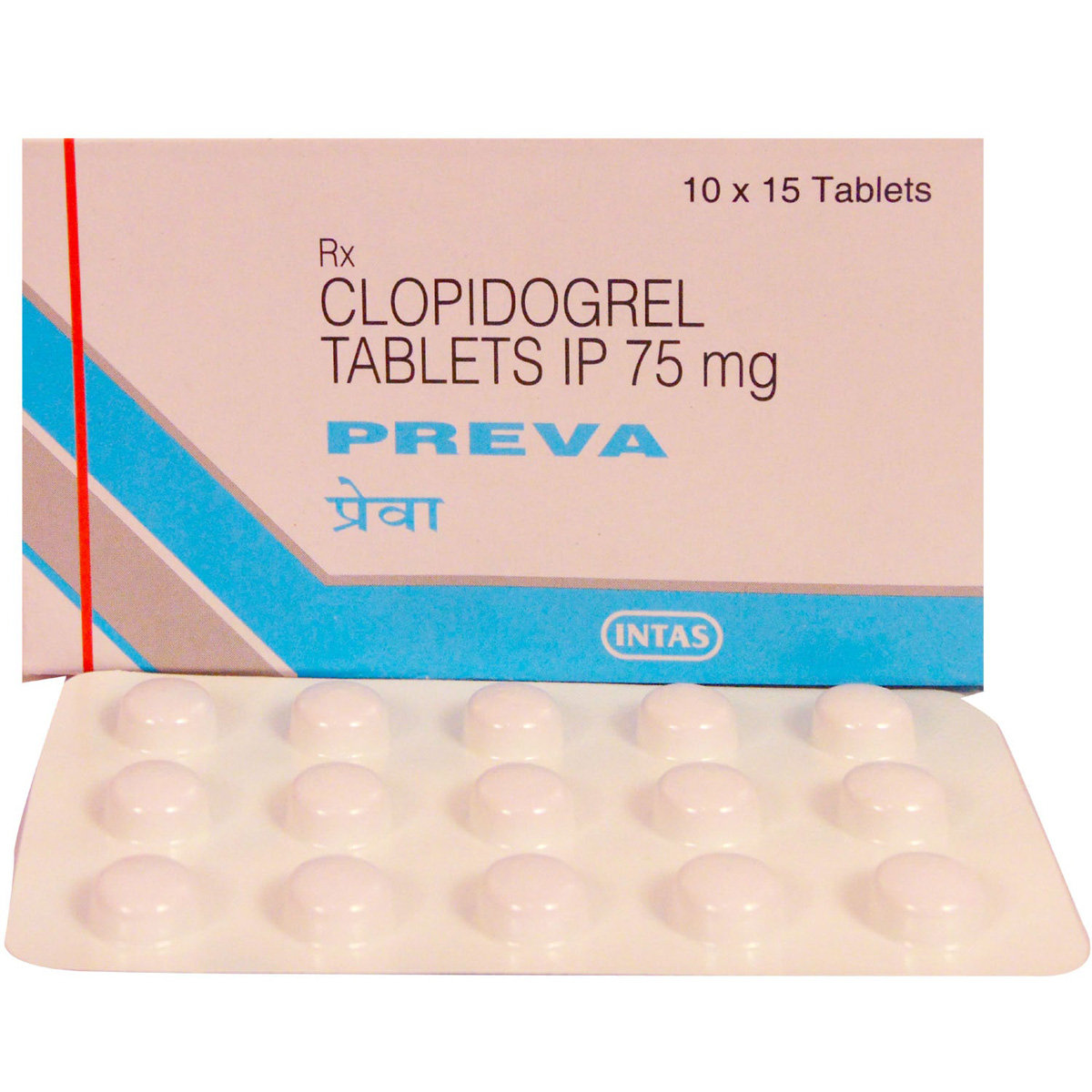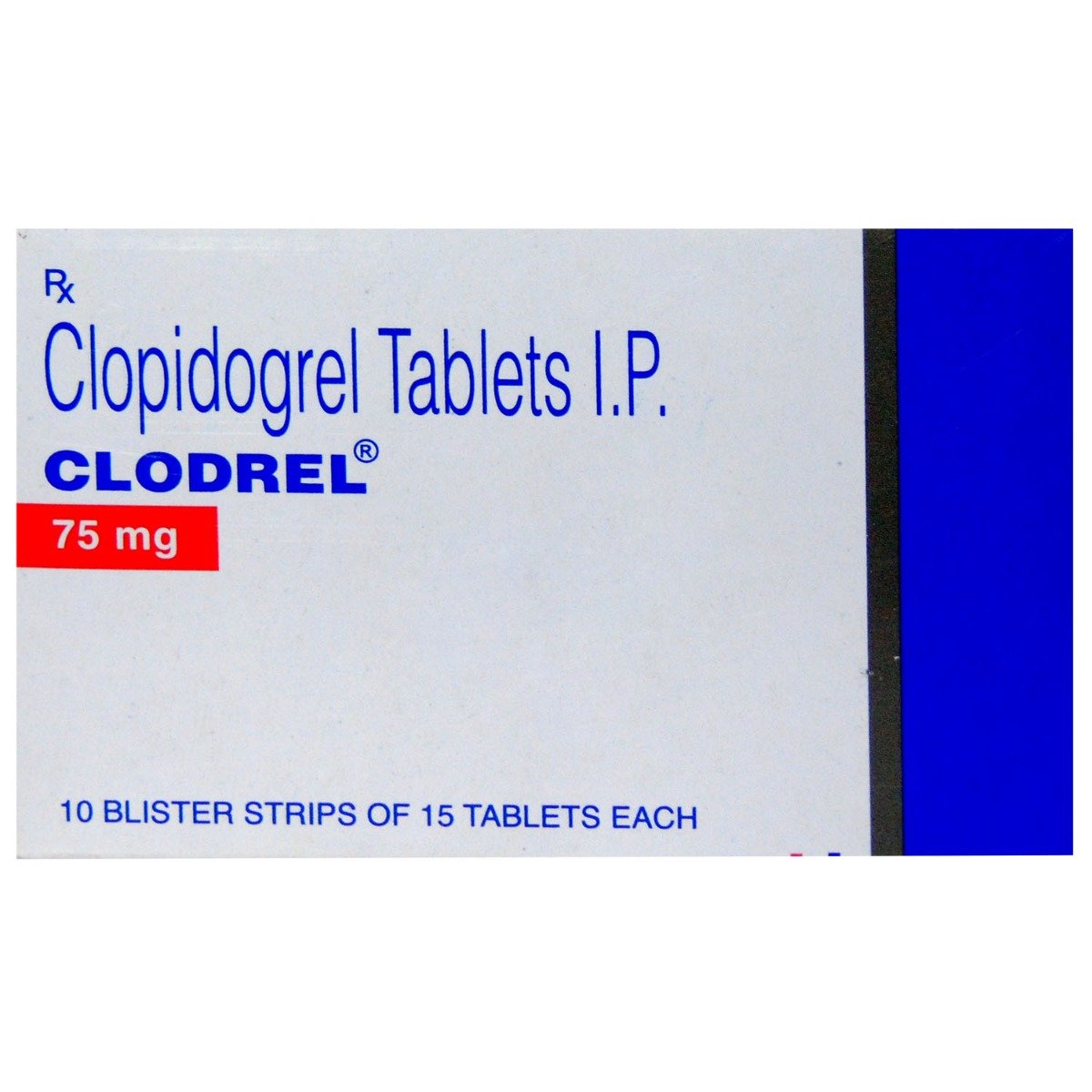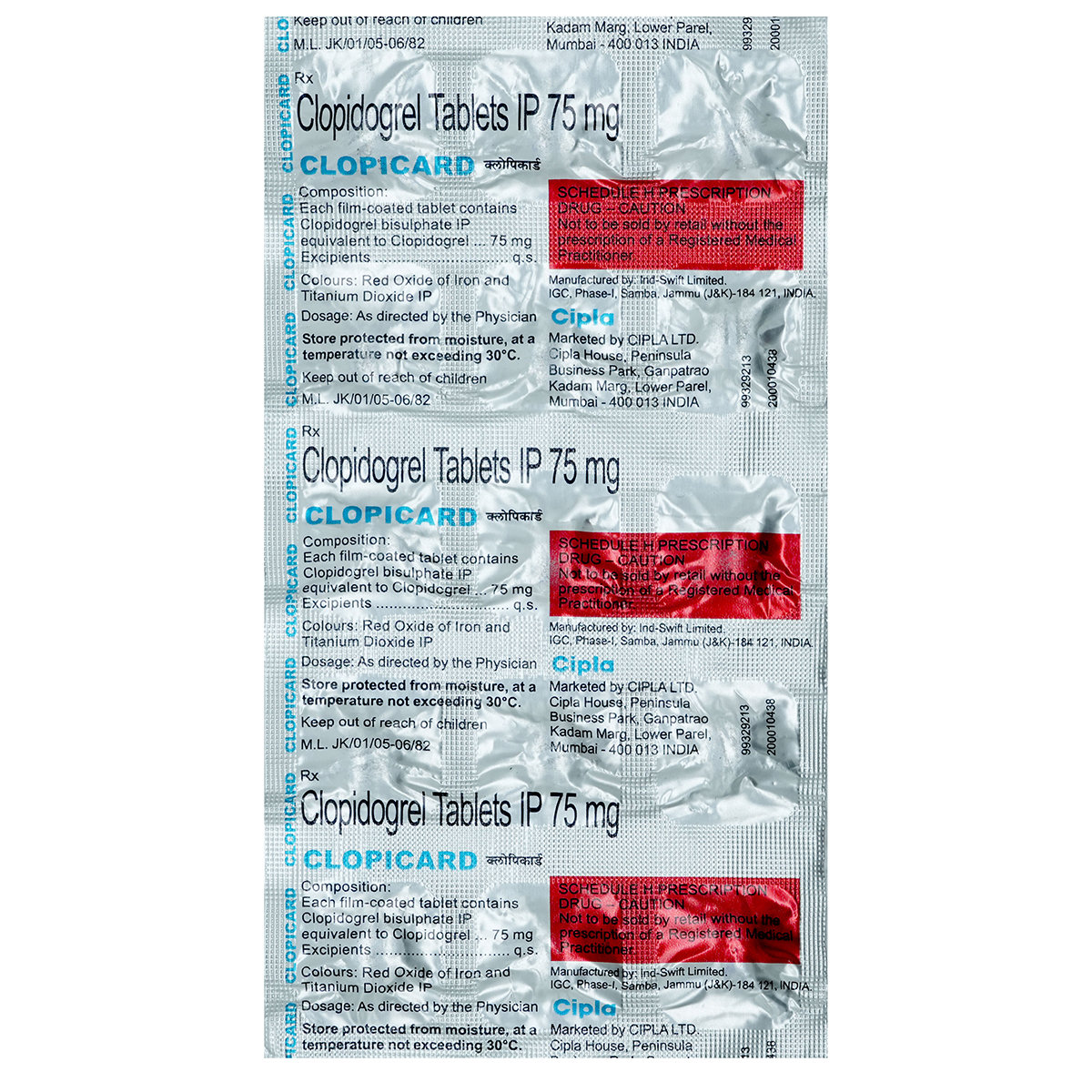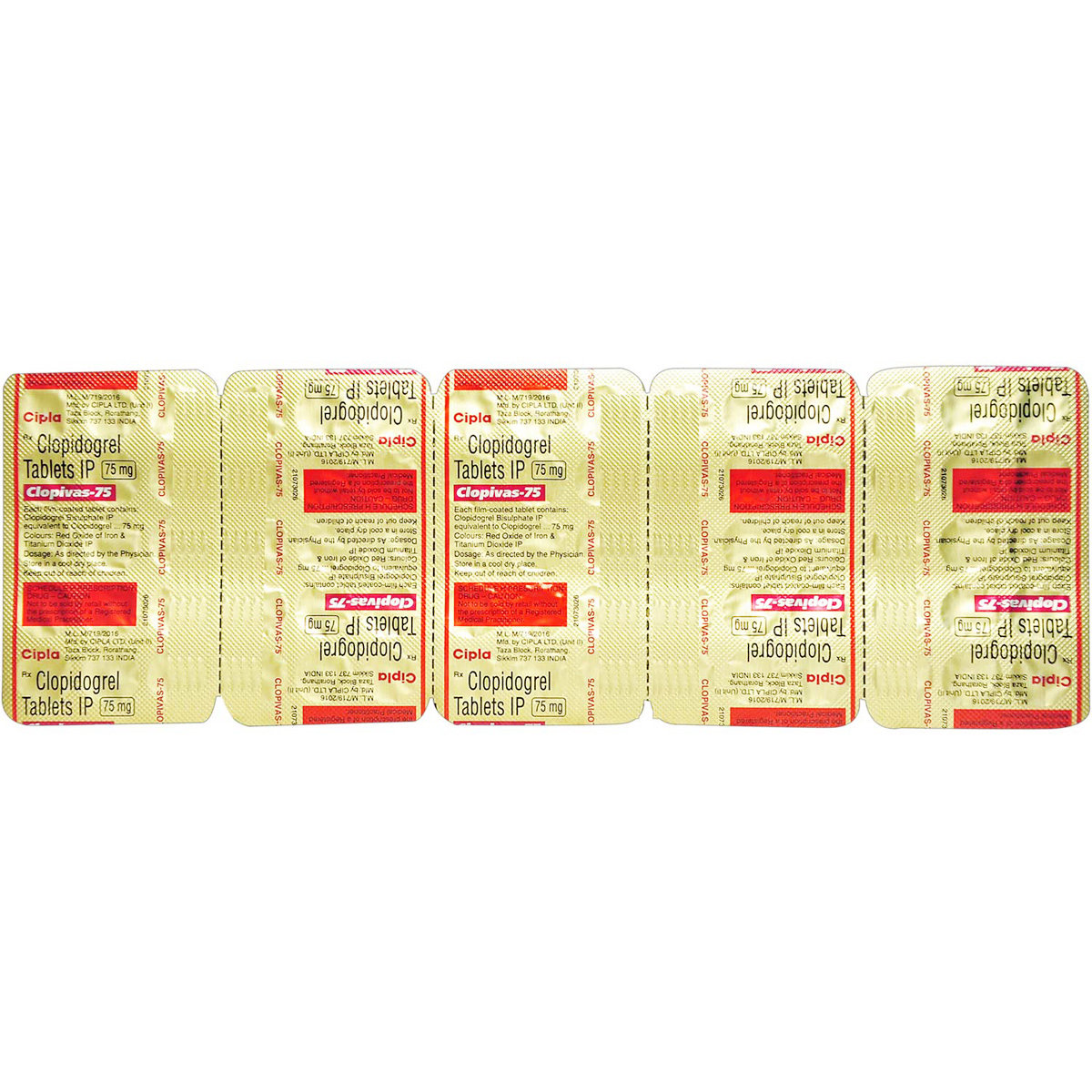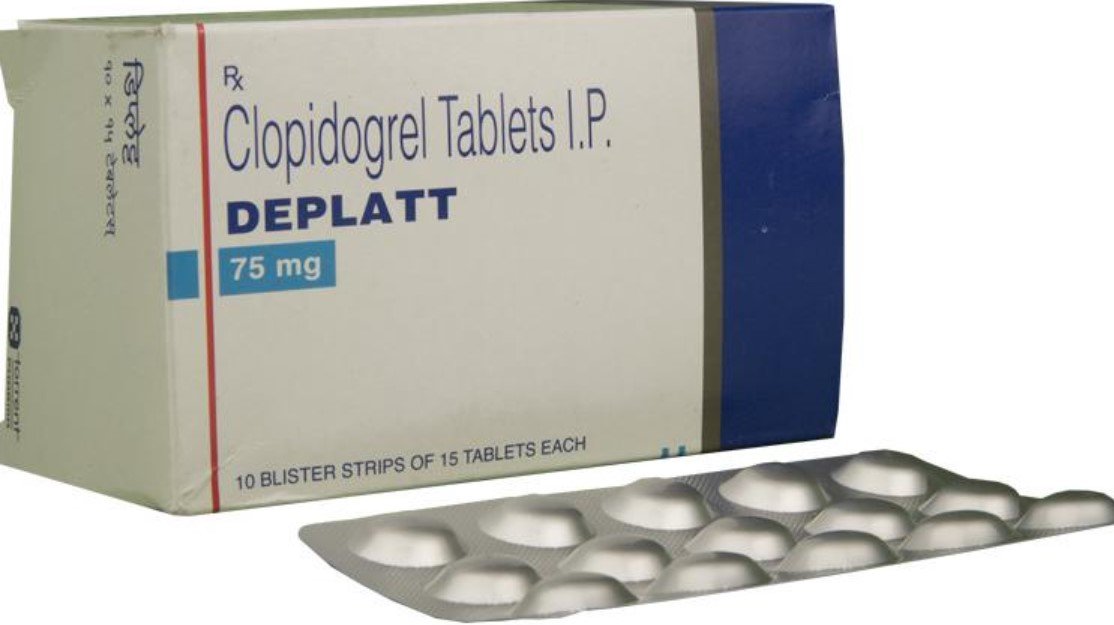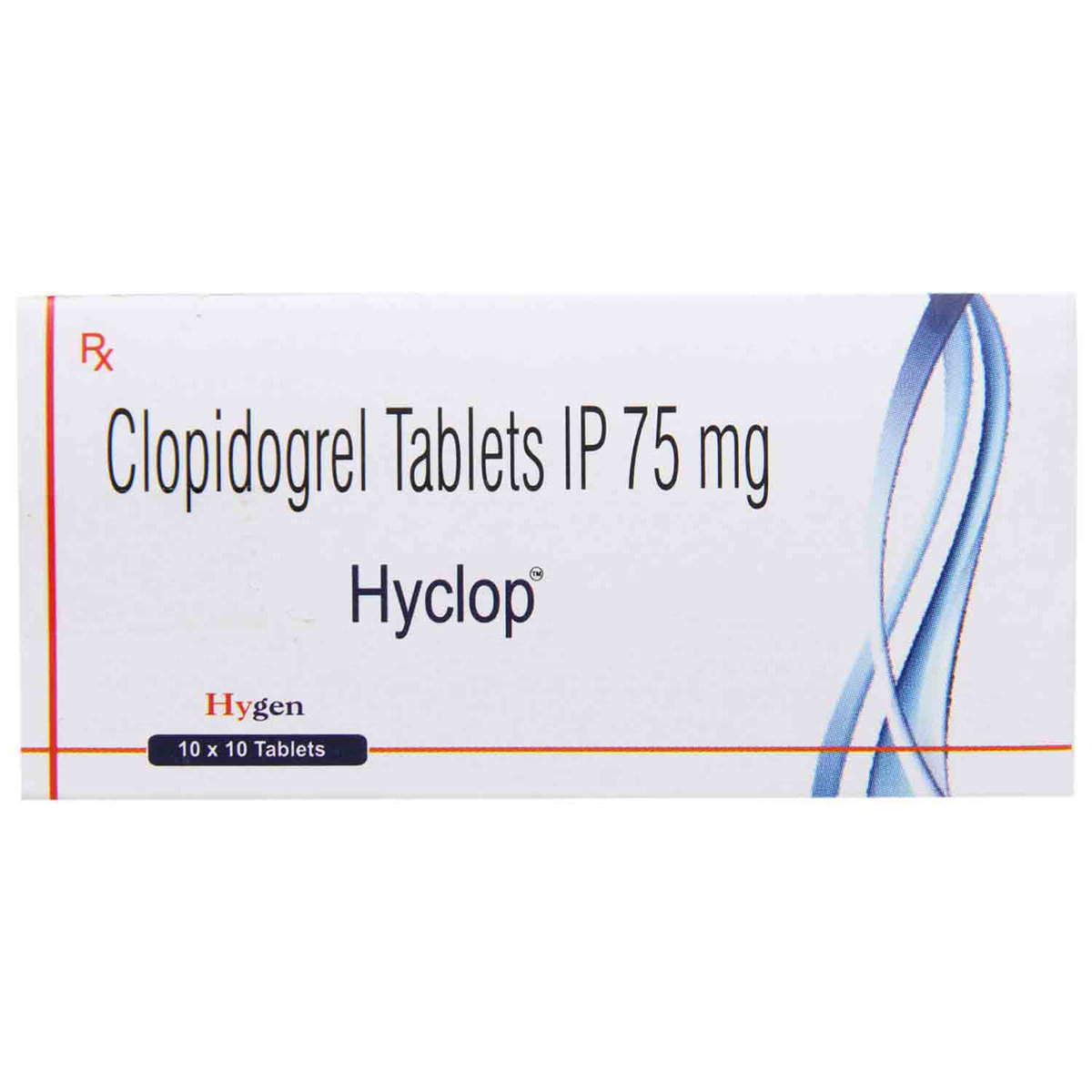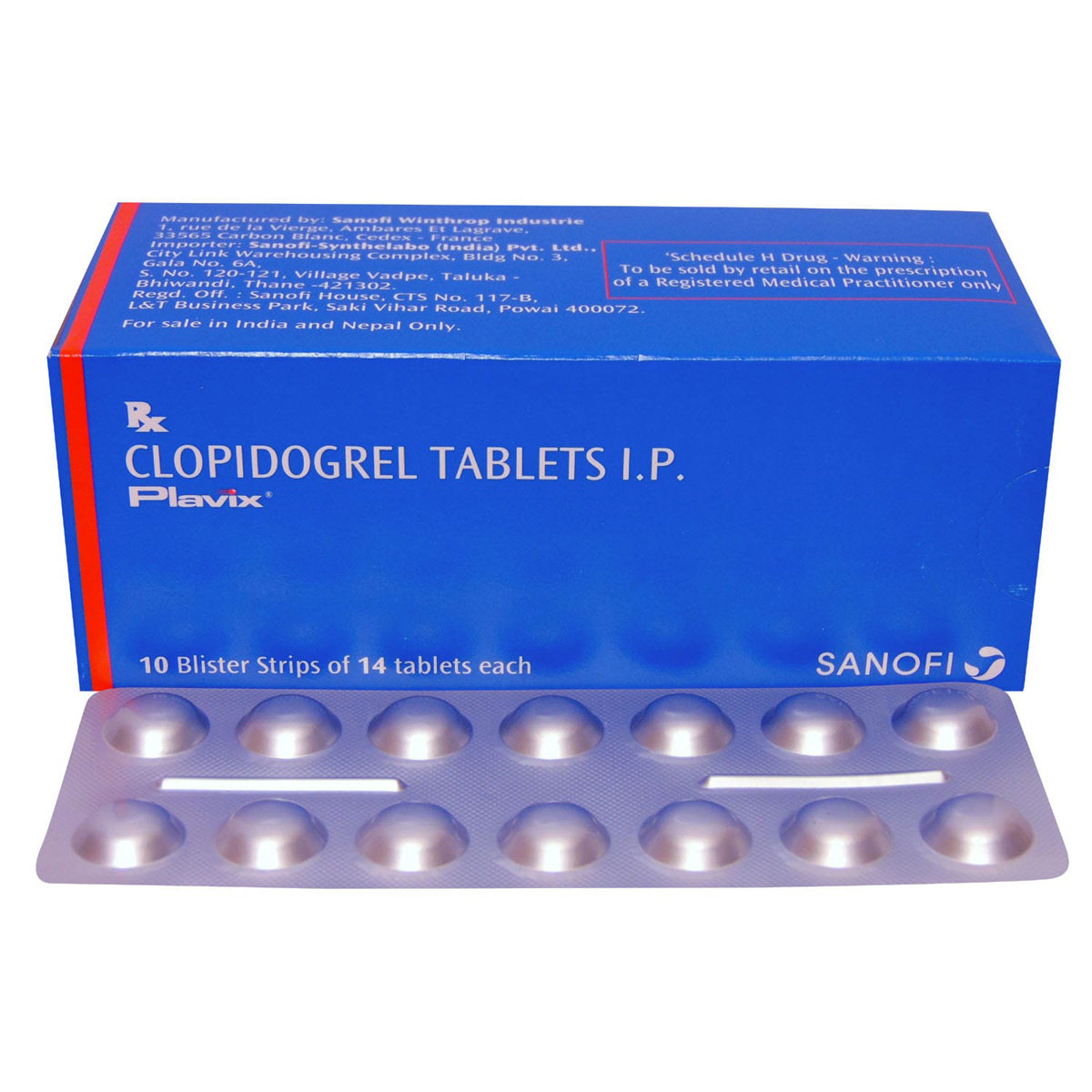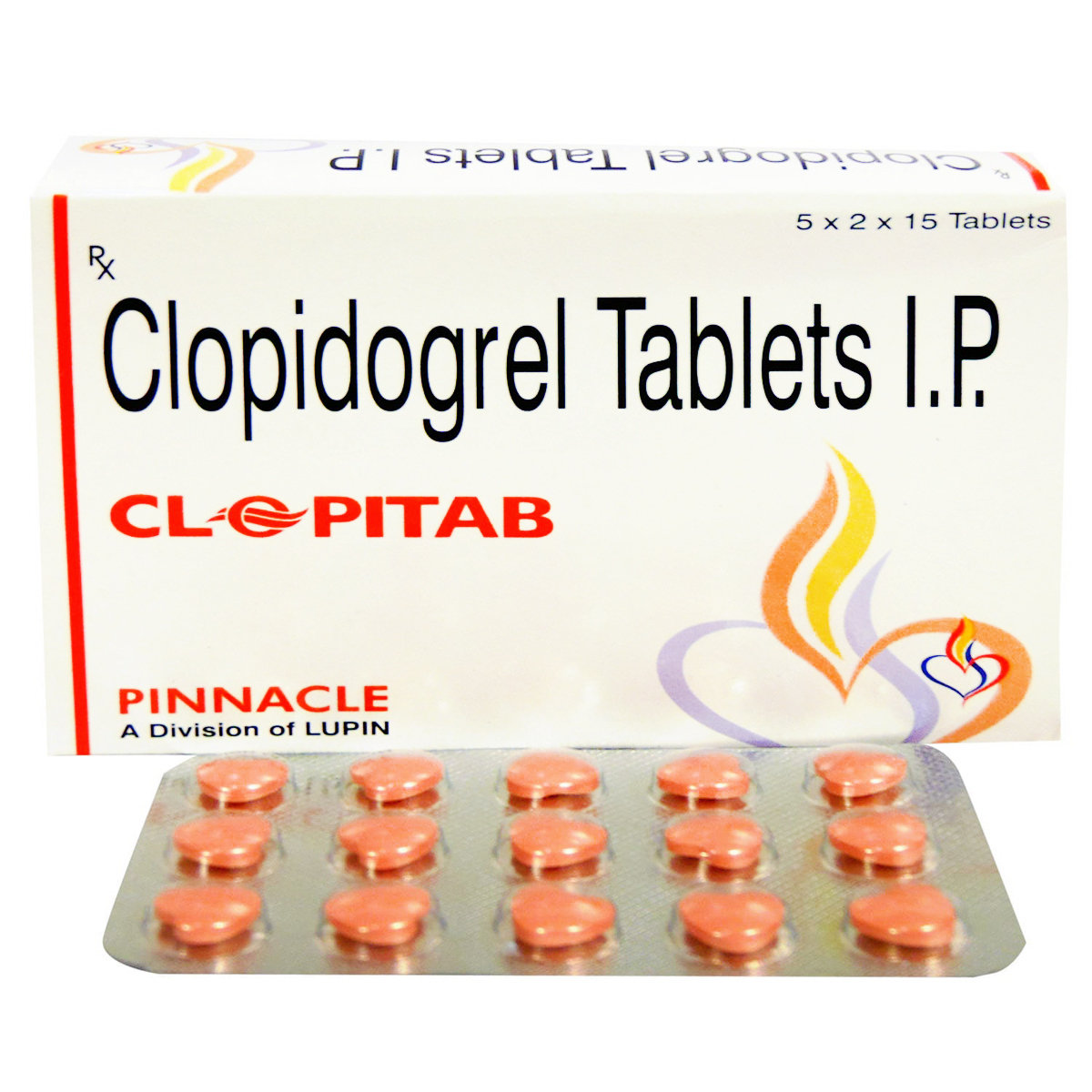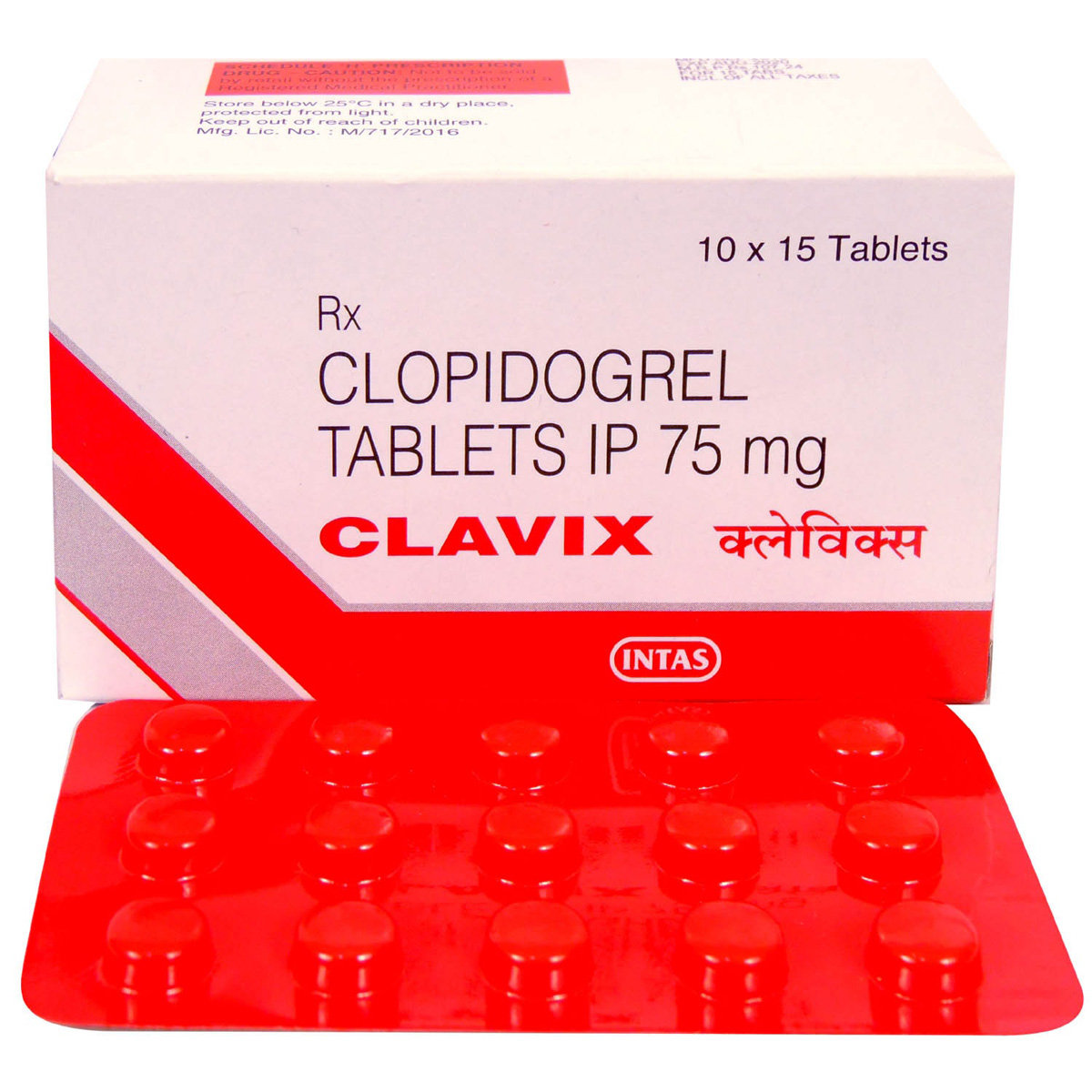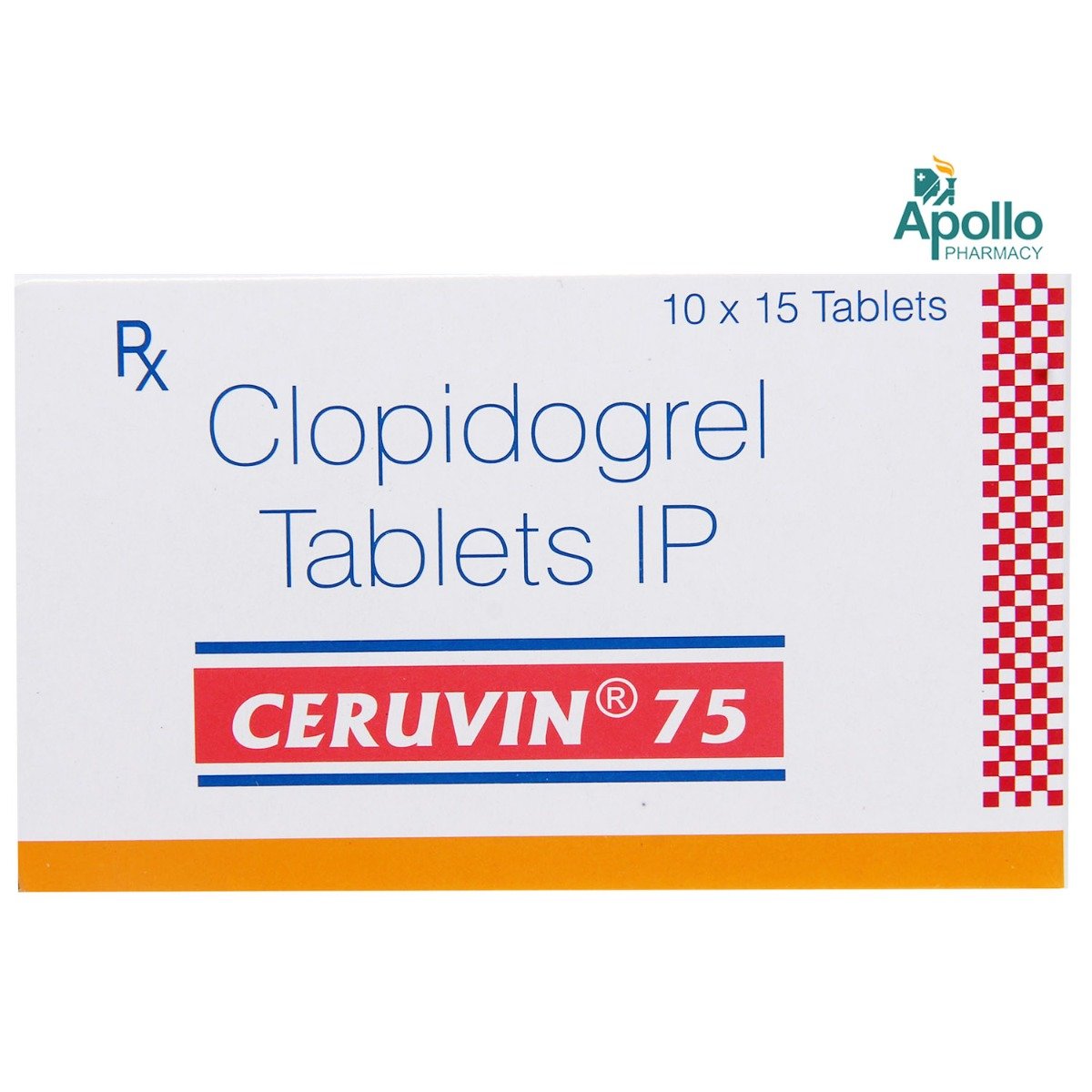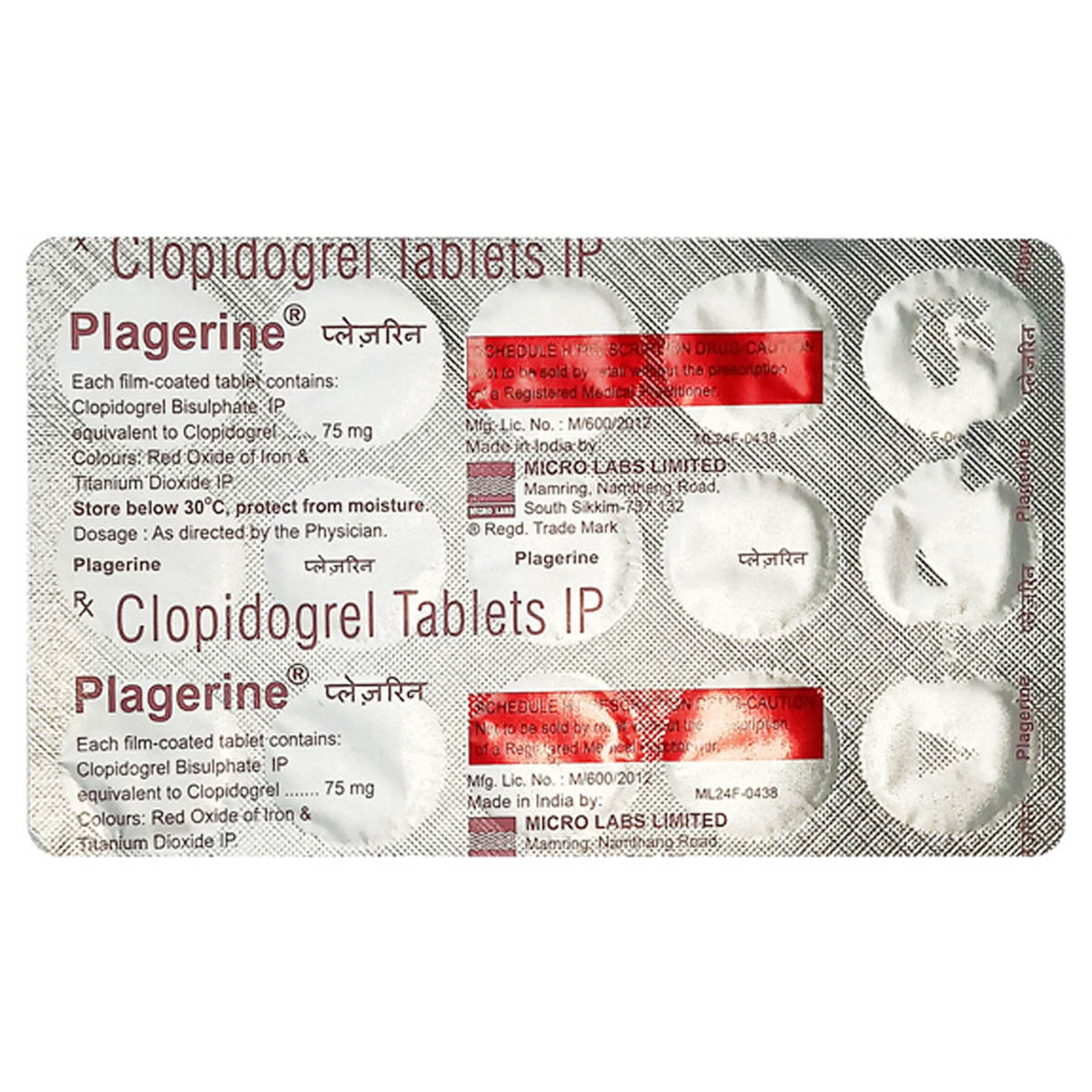- Home
- Clearclot Tablet
Clearclot Tablet Substitute
Clearclot Tablet Substitute
Medicine Composition:
CLOPIDOGREL-75MGAll Substitutes & Brand Comparisons
RX
Clopikind Tablet 10's
Mankind Pharma Pvt Ltd
₹31
(₹2.79 per unit)
53% CHEAPER- Apollo-Trusted
RX
Aquris Clopirel 75 Tablet 10's
Auspharma Pvt Ltd
₹62
(₹3.1 per unit)
47% CHEAPER - Apollo-Trusted
RX
Abclopid 75 Tablet 15's
Abbott India Ltd
₹104.5
(₹4.25 per unit)
28% CHEAPER RX
Preva 75 Tablet 15's
Intas Pharmaceuticals Ltd
₹87
(₹5.23 per unit)
11% CHEAPERRX
Clodrel Tablet 15's
Torrent Pharmaceuticals Ltd
₹88
(₹5.29 per unit)
10% CHEAPER- Apollo-Trusted
RX
Clopicard 75 Tablet 15's
Cipla Ltd
₹106.5
(₹5.33 per unit)
10% CHEAPER RX
Clopivas-75 Tablet 15's
Cipla Ltd
₹100.5
(₹6.03 per unit)
1% COSTLIERRX
Deplatt 75 mg Tablet 15's
Torrent Pharmaceuticals Ltd
₹102.5
(₹6.15 per unit)
3% COSTLIERRX
Hyclop Tablet 10's
Hygen Healthcare Pvt Ltd
₹69
(₹6.21 per unit)
4% COSTLIERRX
Plavix Tablet 14's
Sanofi India Ltd
₹97.5
(₹6.27 per unit)
5% COSTLIERRX
Clopilet 75 mg Tablet 15's
Sun Pharmaceutical Industries Ltd
₹106.5
(₹6.39 per unit)
7% COSTLIERRX
Clopitab Tablet 15's
Lupin Ltd
₹106.5
(₹6.39 per unit)
7% COSTLIERRX
Clavix Tablet 15's
Intas Pharmaceuticals Ltd
₹106.5
(₹6.39 per unit)
7% COSTLIERRX
Ceruvin 75 Tablet 15's
Sun Pharmaceutical Industries Ltd
₹106.5
(₹6.39 per unit)
7% COSTLIERRX
Plagerine 75 mg Tablet 15's
Micro Labs Ltd
₹106.5
(₹6.39 per unit)
7% COSTLIER

When Should You Consider Switching from Clearclot Tablet ?
Patients may explore substitutes in the following scenarios:
- High monthly cost of Clearclot Tablet
- Non-availability in local pharmacies
- Generic recommendation by a doctor
- Side effects or better tolerability with alternatives
What to Know Before Switching
Before you switch from Clearclot Tablet to another medicine, here are some important points to keep in mind:
Same salt, different brands:
Most substitutes contain the same active ingredient - CLOPIDOGREL-75MG, but the fillers, coating, or manufacturing quality may vary slightly.
Consult your doctor first:
Even if the salt is the same, your doctor can confirm if the substitute is right for your condition, dosage, and health history.
Watch out for allergies or reactions:
Some people may react differently to certain brands due to inactive ingredients. If you notice any side effects, inform your doctor immediately.
Price ≠ effectiveness:
A lower-priced substitute doesn't mean it's less effective. Many generic medicines work just as well as branded ones.
Check the dosage form and strength:
Always match the substitute’s strength (e.g., 5mg, 10mg) and form (tablet, capsule, syrup) with what your doctor prescribed.
Uses
Clearclot Tablet used for the prevention of heart attack, Prevention of stroke, and Prevention of heart-related chest pain (angina). The detailed uses of Clearclot Tablet are as follows:
- Prevention of Heart Attack: Clearclot Tablet helps to prevent blood clots that can cause heart attacks by inhibiting platelet aggregation.
- Prevention of Stroke: Clearclot Tablet reduces the risk of stroke by preventing blood clots that can block blood flow to the brain.
- Prevention of Heart-Related Chest Pain (Angina): Clearclot Tablet improves blood flow to the heart, reducing the risk of chest pain (angina) caused by reduced blood flow.
- Management of Acute Coronary Syndrome: Clearclot Tablet manages conditions like unstable angina and myocardial infarction (heart attack) by preventing clot formation.
- Peripheral Arterial Disease: Clearclot Tablet reduces the risk of clot formation in peripheral arteries, improving blood flow to limbs.
Medicinal Benefits
- Clearclot Tablet plays a vital role in preventing the formation of harmful blood clots in your blood vessels by making platelets (clotting agents) stick together.
- It helps to reduce the risk of heart attack, stroke, unstable angina (heart-related chest pain), and peripheral arterial disease (blocked or poor blood flow due to narrowed blood vessels) in heart disease patients and patients who have undergone recent heart surgery with a stent.
FAQs
The substitutes of Clearclot Tablet contain the same active salt(s) - CLOPIDOGREL-75MG. However, they may differ in price, manufacturing quality, and inactive ingredients. Speak to your doctor to find a suitable option.
Switching to a generic substitute medicine in the place of Clearclot Tablet is often possible if it has the same salt, strength, and dosage form. But always check with your doctor before making any changes to your medication.
Generics versions of Clearclot Tablet are typically more affordable because they don’t include the original brand's research, development, and marketing costs. They contain the same active ingredient and are approved for safety and effectiveness.
Most people don’t notice any difference. However, some may react to different fillers or coatings. If you notice any unusual symptoms after switching, consult your doctor.
Make sure the new medicine has the same active salt, strength, dosage form. Always confirm the change with your doctor or pharmacist.
Substitutes of Clearclot Tablet meet the same safety and efficacy standards as Clearclot Tablet , but small differences in absorption or formulation can exist. A doctor can help you choose the right one for your needs.
Yes. Substitutes of Clearclot Tablet may vary in color, size, or shape due to differences in manufacturing and branding, but this does not affect how they work.
Yes, it’s generally safe to switch between multiple substitutes of Clearclot Tablet if they have the same salt and strength. However, always inform your doctor so they can monitor how your body responds.
Yes, many people safely use substitutes of Clearclot Tablet for long-term treatment. Just ensure it’s done under medical supervision.
If your symptoms stay under control or lab results remain stable, the substitute for Clearclot Tablet is likely working well. Regular follow-ups with your doctor are important.
Absolutely. Even with the same salt, small differences can affect how your body responds when switching from Clearclot Tablet to its substitute. Always consult your doctor before switching.
Clearclot Tablet is used to prevent heart attack or stroke in people at high risk of heart disease.
Clearclot Tablet belongs to a class of medications called a blood thinner or an antiplatelet medication. Clearclot Tablet plays a vital role in preventing the formation of harmful blood clots (plaque) in your veins. It makes blood flow easily through your veins, making it less likely to form a serious blood clot. So, an intake of Clearclot Tablet helps prevent blood clots if you have an increased risk of having severe chest pain (unstable angina or heart attack), stroke, and peripheral arterial disease (heart problem due to narrowed blood vessels).
Yes, Clearclot Tablet causes blood to thin. It works by preventing platelets (a type of blood cell) from sticking together and forming clots.
Please consult your doctor if Clearclot Tablet needs to be stopped before undergoing surgery. The doctor might ask you to stop taking Clearclot Tablet a few days before surgery to avoid the increased risk of bleeding during the procedure.
Do not take aspirin for pain relief or ibuprofen while you are taking Clearclot Tablet unless your doctor says it's OK. They raise the risk of unusual bleeding.
When a blood clot is treated, guidelines recommend that patients take blood thinners for the rest of their lives. If they do not, the chance of developing a second clot is 30 to 40 per cent in the next 10 years.
There might be a problem if you are taking herbal therapies with Clearclot Tablet , especially those that affect the blood, like Ginkgo Biloba and St John's wort plant extract used as an antidepressant. Together, taking can increase your risk of bleeding. Tell your doctor if you are using any type of herbal supplements before taking Clearclot Tablet .
Yes, taking Clearclot Tablet can increase the risk of bleeding as it contains aspirin, which is a blood thinner. So, please be very cautious while shaving, cutting fingernails or toenails, or using sharp objects to avoid any bleeding.
Clearclot Tablet should be swallowed as a whole with water; do not crush or chew it. Clearclot Tablet can be taken at any time of the day, but taking it at the same time daily would be better.
Yes, Clearclot Tablet is a blood thinner. It contains clopidogrel, an antiplatelet medicine that prevents the formation of harmful blood clots.
No, Clearclot Tablet is not a steroid. It is an antiplatelet medicine.
Clearclot Tablet might lower the blood pressure. Not everyone experiences this as it is a rare side effect. Consult the doctor if you experience dizziness, blurred vision or light-headedness.
Do not take Clearclot Tablet if you are allergic to any of its components, have severe liver disease or have a medical condition that causes bleeding such as a stomach ulcer or bleeding within the brain.
You can drink alcohol with Clearclot Tablet . But do not drink too much alcohol as it can cause stomach irritation.
Avoid taking omeprazole along with Clearclot Tablet as omeprazole can reduce the levels of clopidogrel and affect its working. Consult the doctor before taking omeprazole with Clearclot Tablet .
Stopping Clearclot Tablet may increase the risk of heart attack or stroke. Therefore, do not discontinue Clearclot Tablet without consulting your doctor.
Clearclot Tablet starts working within 2 hours of taking it.
Clearclot Tablet should be taken for as long as it has been prescribed by the doctor. The doctor will determine the duration of treatment based on your condition.
Yes, you can eat food while taking Clearclot Tablet as it helps lower stomach irritation.
Be cautious while using sharp objects as you may bleed more easily or for a longer time than usual while you are taking Clearclot Tablet . Let the doctor know that you are taking Clearclot Tablet if you are due to undergo any surgery or dental procedure.
If you miss a dose of Clearclot Tablet take it as soon as you remember, However, if it is almost time for the scheduled dose, skip the missed dose and take the next dose at the scheduled time.
Consult the doctor before taking other medicines while on treatment with Clearclot Tablet . Let the doctor know if you are using anticoagulants, painkillers, antidepressants or indigestion medicines.
Side effects of Clearclot Tablet include diarrhoea, stomach pain, indigestion, heartburn, headache, nausea, vomiting, constipation, and dizziness. Consult the doctor if the side effects persist or worsen.
Buy best Cardiology products by
Torrent Pharmaceuticals Ltd
Lupin Ltd
Sun Pharmaceutical Industries Ltd
Intas Pharmaceuticals Ltd
Cipla Ltd
Micro Labs Ltd
Macleods Pharmaceuticals Ltd
Abbott India Ltd
Ajanta Pharma Ltd
Ipca Laboratories Ltd
Eris Life Sciences Ltd
Mankind Pharma Pvt Ltd
Lloyd Healthcare Pvt Ltd
Dr Reddy's Laboratories Ltd
Emcure Pharmaceuticals Ltd
Alembic Pharmaceuticals Ltd
Glenmark Pharmaceuticals Ltd
Alkem Laboratories Ltd
Zydus Healthcare Ltd
East West Pharma India Pvt Ltd
USV Pvt Ltd
Aristo Pharmaceuticals Pvt Ltd
Alteus Biogenics Pvt Ltd
J B Chemicals & Pharmaceuticals Ltd
Elbrit Life Sciences Pvt Ltd
Fusion Health Care Pvt Ltd
Eswar Therapeutics Pvt Ltd
La Renon Healthcare Pvt Ltd
Zydus Cadila
Akumentis Healthcare Ltd
Hbc Life Sciences Pvt Ltd
Troikaa Pharmaceuticals Ltd
Knoll Healthcare Pvt Ltd
Corona Remedies Pvt Ltd
Morepen Laboratories Ltd
Prevego Healthcare & Research Pvt Ltd
Shrrishti Health Care Products Pvt Ltd
Lividus Pharmaceuticals Pvt Ltd
Medley Pharmaceuticals Ltd
Cadila Pharmaceuticals Ltd
Jubilant Lifesciences Ltd
Msn Laboratories Pvt Ltd
Zuventus Healthcare Ltd
Steris Healthcare
Ranmarc Labs
Elder Pharmaceuticals Ltd
Leeford Healthcare Ltd
Tas Med India Pvt Ltd
Unison Pharmaceuticals Pvt Ltd
Primus Remedies Pvt Ltd
Blue Cross Laboratories Pvt Ltd
Sanofi India Ltd
Azkka Pharmaceuticals Pvt Ltd
Sinsan Pharmaceuticals Pvt Ltd
Systopic Laboratories Pvt Ltd
Nirvana India Pvt Ltd
Orsim Pharma
Knoll Pharmaceuticals Ltd
Indiabulls Pharmaceuticals Pvt Ltd
RPG Life Sciences Ltd
Biochem Pharmaceutical Industries Ltd
Johnlee Pharmaceuticals Pvt Ltd
Olcare Laboratories Pvt Ltd
Vasu Organics Pvt Ltd
Cadila Healthcare Ltd
Econ Healthcare
Shine Pharmaceuticals Ltd
Xemex Life Sciences
Elicad Pharmaceuticals Pvt Ltd
Elinor Pharmaceuticals (P) Ltd
Sunij Pharma Pvt Ltd
Atos Lifesciences Pvt Ltd
LSD Pharmaceuticals
Orris Pharmaceuticals
Pfizer Ltd
FDC Ltd
Lia Life Sciences Pvt Ltd
MEDICAMEN BIOTECH LTD
Nicholas Piramal India Ltd
Lakshya Life Sciences Pvt Ltd
Opsis Care Lifesciences Pvt Ltd
Pficus De Med Pvt Ltd
Alvio Pharmaceuticals Pvt Ltd
Biocon Ltd
Finecure Pharmaceuticals Ltd
Glynis Pharmaceuticals Pvt Ltd
Indoco Remedies Ltd
Med Manor Organics Pvt Ltd
Verse Lifesciences
Acmedix Pharma Llp
Allysia Lifesciences Pvt Ltd
Astra Zeneca Pharma India Ltd
Chemo Healthcare Pvt Ltd
Proqol Health Care Pvt Ltd
Divine Savior Pvt Ltd
Enovus Healthcare Pvt Ltd
Ergos Life Sciences Pvt Ltd
Samarth Life Sciences Pvt Ltd
Signova Pharma
Tesla Labs

